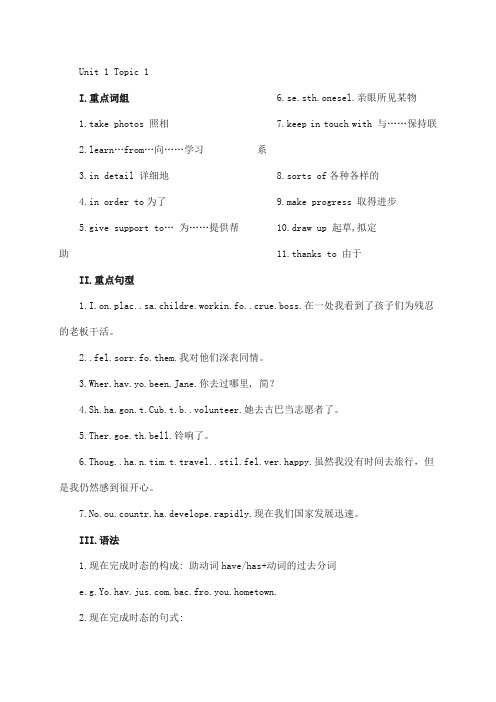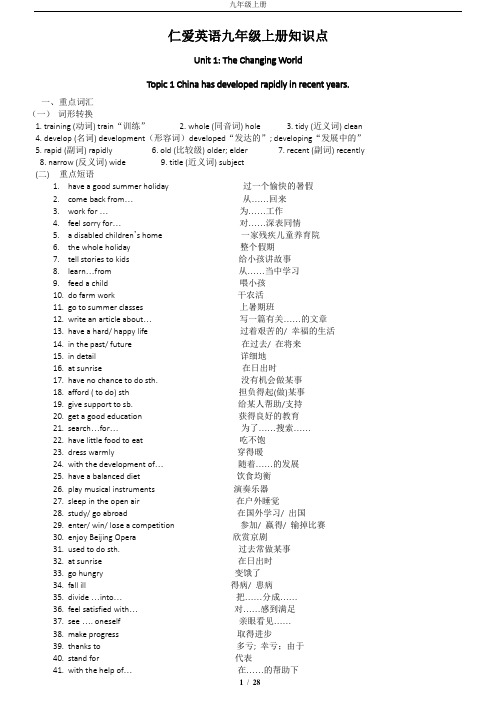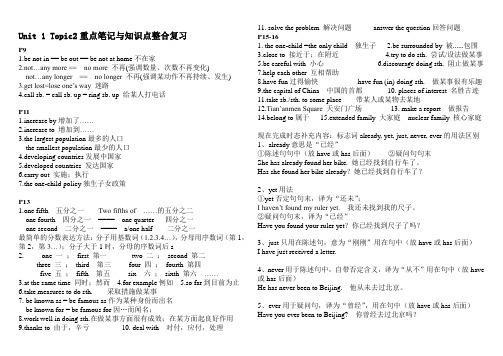仁爱版九年级上英语复习重点
英语九年级上知识点仁爱版

英语九年级上知识点仁爱版英语九年级上册是初中英语课程的一部分,主要涵盖了基础知识、语法规则、词汇和阅读技巧等方面。
本文将对九年级上册的知识点做一个全面的总结。
一、基础知识1. 时态:九年级上册重点学习了一般过去时、一般现在时、一般将来时、现在进行时、过去进行时和过去将来时等时态的用法和构成。
2. 代词:包括人称代词、物主代词、反身代词、指示代词和不定代词等,在句子中起到代替名词的作用。
3. 名词:涵盖可数名词、不可数名词、复数形式和所有格等。
在句子中充当主语、宾语或定语的成分。
4. 形容词:描述名词性物体的特征或者状态,构成形容词的比较级和最高级,以及形容词的位置和修饰范围等。
5. 副词:用来修饰动词、形容词、副词或者整句的成分,并且用于表示时间、地点、方式、程度等。
6. 介词:表示人和事物之间的关系,在句子中起到连接和修饰的作用。
7. 数词:包括基数词和序数词,用来表示数量或者顺序。
8. 冠词:包括不定冠词和定冠词,用于特指或者泛指名词。
二、语法规则1. 直接引语和间接引语:学习了如何将别人的话转述为间接引语,包括变动词、时态和人称等的变化。
2. 定语从句:学习了如何用关系代词或关系副词引导定语从句,修饰名词。
3. 名词性从句:学习了主语从句、宾语从句和表语从句的构成和用法。
4. 状语从句:学习了时间、地点、原因、结果和条件等状语从句的引导词和句型。
5. 倒装句:学习了部分倒装和完全倒装的句式,包括情态动词、Here/There引导的倒装句等。
三、词汇1. 动词短语:学习了一些常用的英语动词短语,如lookforward to、take care of、give up等。
2. 可数和不可数名词:学习了一些常见的可数和不可数名词,如money、information、furniture等。
3. 同义词和反义词:学习了一些词义相近或相反的单词,如big和large、happy和glad等。
四、阅读技巧1. 阅读理解:学习了如何通过阅读材料来获取信息、推理和理解文章的意思。
仁爱版九年级上册英语知识点

仁爱版九年级上册英语知识点一、Unit 1 The Developing World。
1. 重点单词。
- describe:v. 描述;形容。
例如:Can you describe your new school?- provide:v. 提供;供应。
常用搭配:provide sb. with sth.或者provide sth. for sb.,如:The school provides us with a good learning environment.- remain:v. 保持;依然。
可作系动词,后接形容词等作表语,例如:He remained silent at the meeting.- increase:v. & n. 增加;增长。
increase by表示“增加了……”,increase to表示“增加到……”。
2. 重点短语。
- be short of:短缺;缺乏。
例如:The area is short of water.- so far:到目前为止,常与现在完成时连用。
如:So far, we have learned a lot in this semester.- take place:发生,通常指有计划、有安排地发生,没有被动语态。
例如:The sports meeting will take place next week.3. 重点句型。
- It is + adj. + for sb. to do sth.:对某人来说做某事是……的。
例如:It is important for us to protect the environment.- have/has been to与have/has gone to的区别:- have/has been to表示“去过某地(已经回来)”,例如:I have been to Beijing twice.- have/has gone to表示“去了某地(还没回来)”,例如:He has gone to Shanghai on business.二、Unit 2 Saving the Earth。
(完整版)仁爱英语九年级上册知识点归纳

Unit 1 Topic 1I.重点词组1.take photos 照相2.learn…from…向……学习3.in detail 详细地4.in order to为了5.give support to…为……提供帮助6.se.sth.onesel.亲眼所见某物7.keep in touch with 与……保持联系8.sorts of各种各样的9.make progress 取得进步10.draw up 起草,拟定11.thanks to 由于II.重点句型1.I.on.plac..sa.childre.workin.fo..crue.boss.在一处我看到了孩子们为残忍的老板干活。
2..fel.sorr.fo.them.我对他们深表同情。
3.Wher.hav.yo.been.Jane.你去过哪里, 简?4.Sh.ha.gon.t.Cub.t.b..volunteer.她去古巴当志愿者了。
5.Ther.goe.th.bell.铃响了。
6.Thoug..ha.n.tim.t.travel..stil.fel.ver.happy.虽然我没有时间去旅行,但是我仍然感到很开心。
7.No.ou.countr.ha.develope.rapidly.现在我们国家发展迅速。
III.语法1.现在完成时态的构成: 助动词have/has+动词的过去分词.bac.fro.you.hometown.2.现在完成时态的句式:e.g.(1..hav.bee.t.Moun.Huan.wit.m.parents.(2) I haven’t seen him for a long time.(3) Where have you been?(4.——Hav.yo.eve.cleane..room?.——Yes..have..No..haven’t.3.have.ha.been.have/ha.gon.的区别have/has been to sp.表示曾经到过某地—— have/has gone to sp.表示已经去了某地e.g.(1..hav.bee.t.Moun.Huan.wit.m.parents. .(2.Sh.ha.gon.t.Cub.t.b..vo lunteer.Unit 1 Topic 2I.重点词组1. get lost 迷路2. each other 彼此3.at least 至少4take place发生5because of 因为6.b.stric.wit.sb.对某人严格要求.7.carry out 实行8.be short of 缺乏9.take measures to do sth.采取措施做某事10.be known as…作为……而著名11.work well in doing…在……方面起作用12.a couple of 一些13keep up with赶上,跟上II.重点句型1.Hav.yo.foun.hi.yet.你已经找到他了吗?2.——.reall.hat.t.g.shopping.我的确讨厌购物。
仁爱版英语九年级上册知识点总结汇总

仁爱版英语九年级上册知识点总结汇总仁爱版英语九年级上册知识点汇总Unit 1: The Changing WorldTopic 1: XXXIn this topic。
we learn about the development of our country and how it has changed over time。
Some important phrases and sentence structures include:Have a good summer holiday: Wishing someone a happy summer break.Come back from: XXX.Have/has been to: Visiting a place in the past.Have/has gone to: Going to a place in the present.Not。
any more: No longer doing something.XXX: Capturing images with a camera.By the way: Used to XXX.Take part in: XXX.XXX: Referring to something that is global.Tell sb。
something about: XXX.Have/live a happy/hard life: Describing XXX.XXX: XXX.Give support to: XXX.XXX。
oneself: Witnessing something with one's own eyes.Keep in touch with: XXX.Far away: Referring to something that is distant.XXX: Referring to different types of something.Not only。
仁爱版九年级上册英语知识点

仁爱版九年级上册英语知识点Unit 1: Personal Information- Vocabulary: family members, nationalities, occupations, hobbies- Grammar: possessive adjectives, present simple tense, frequency adverbsUnit 2: School Life- Vocabulary: school subjects, school facilities, classroom objects- Grammar: imperatives, present continuous tense, prepositions of placeUnit 3: Daily Routine- Vocabulary: daily activities, adverbs of frequency, time expressions- Grammar: simple past tense, past continuous tense, past habitual actionsUnit 4: Health and Fitness- Vocabulary: sports and exercises, healthy lifestyle, food and nutrition- Grammar: comparatives and superlatives, should and shouldn'tUnit 5: Environmental Protection- Vocabulary: environmental problems, conservation, recycling- Grammar: modal verbs (can, could, may, might), present perfect tenseUnit 6: Technology and Communication- Vocabulary: electronic devices, internet and social media, communication skills- Grammar: future forms (will, be going to, present continuous for future)Unit 7: Travel and Adventure- Vocabulary: travel destinations, transportation, vacation activities - Grammar: past perfect tense, reported speech, phrasal verbsUnit 8: Culture and Traditions- Vocabulary: festivals and celebrations, cultural customs, traditional dishes- Grammar: passive voice, conditionals (zero and first)Unit 9: Jobs and Careers- Vocabulary: job interviews, workplace skills, types of jobs- Grammar: present perfect continuous tense, relative clausesUnit 10: Dreams and Ambitions- Vocabulary: future plans, goals and aspirations, personal qualities - Grammar: indirect questions, wish and hope以上是仁爱版九年级上册英语的知识点总结。
仁爱英语九年级上册知识点总结复习专用

仁爱英语九年级上册知识点Unit 1: The Changing WorldTopic 1 China has developed rapidly in recent years.一、重点词汇(一)词形转换1. training (动词) train“训练”2. whole (同音词) hole3. tidy (近义词) clean4. develop (名词) development(形容词)developed“发达的”; developing“发展中的”5. rapid (副词) rapidly6. old (比较级) older; elder7. recent (副词) recently8. narrow (反义词) wide 9. title (近义词) subject(二)重点短语1.have a good summer holiday 过一个愉快的暑假e back from…从……回来3.work for …为……工作4.feel sorry for…对……深表同情5. a disabled children’s home 一家残疾儿童养育院6.the whole holiday 整个假期7.tell stories to kids 给小孩讲故事8.learn…from 从……当中学习9.feed a child 喂小孩10.do farm work 干农活11.go to summer classes 上暑期班12.write an article about…写一篇有关……的文章13.have a hard/ happy life 过着艰苦的/ 幸福的生活14.in the past/ future 在过去/ 在将来15.in detail 详细地16.at sunrise 在日出时17.have no chance to do sth. 没有机会做某事18.afford ( to do) sth 担负得起(做)某事19.give support to sb. 给某人帮助/支持20.get a good education 获得良好的教育21.search…for…为了……搜索……22.have little food to eat 吃不饱23.dress warmly 穿得暖24.with the development of…随着……的发展25.have a balanced diet 饮食均衡26.play musical instruments 演奏乐器27.sleep in the open air 在户外睡觉28.study/ go abroad 在国外学习/ 出国29.enter/ win/ lose a competition 参加/ 赢得/ 输掉比赛30.enjoy Beijing Opera 欣赏京剧ed to do sth. 过去常做某事32.at sunrise 在日出时33.go hungry 变饿了34.fall ill 得病/ 患病35.divide …into…把……分成……36.feel satisfied with…对……感到满足37.see …. oneself 亲眼看见……38.make progress 取得进步39.thanks to 多亏; 幸亏;由于40.stand for 代表41.with the help of…在……的帮助下42.draw up an outline 拟定提纲三、重点句型1.You have just come back from your hometown. 你刚刚从你的家乡返回。
仁爱英语九年级上册Unit-1-Topic2重点笔记与知识点整合复习+综合训练题

Unit 1 Topic2重点笔记与知识点整合复习P91.be not in == be out == be not at home不在家2.not…any more == no more 不再(强调数量、次数不再变化)not…any longer == no longer 不再(强调某动作不再持续、发生)3.get lost=lose one’s way 迷路4.call sb. = call sb. up = ring sb. up 给某人打电话P111.increase by增加了……2.increase to 增加到……3.the largest population最多的人口the smallest population最少的人口4.developing countries发展中国家5.developed countries 发达国家6.carry out 实施;执行7.the one-child policy独生子女政策P131.one fifth 五分之一Two fifths of ……的五分之二one fourth 四分之一==== one quarter 四分之一one second 二分之一==== a/one half 二分之一最简单的分数表达方法:分子用基数词(1.2.3.4…),分母用序数词(第1,第2,第3…);分子大于1时,分母的序数词后s2. one 一;first 第一two 二;second 第二three 三;third 第三four 四;fourth 第四five 五;fifth 第五six 六;sixth 第六……3.at the same time 同时;然而4.for example例如5.so far到目前为止6.take measures to do sth. 采取措施做某事7. be known as = be famous as作为某种身份而出名be known for = be famous for因…而闻名;8.work well in doing sth.在做某事方面很有成效;在某方面起良好作用9.thanks to 由于,辛亏10. deal with 对付,应付,处理11. solve the problem 解决问题answer the question回答问题P15-161. the one-child =the only child 独生子2.be surrounded by 被......包围3.close to 接近于;在附近4.try to do sth. 尝试/设法做某事5.be careful with 小心6.discourage doing sth. 阻止做某事7.help each other 互相帮助8.have fun过得愉快have fun (in) doing sth. 做某事很有乐趣9.the capital of China 中国的首都10. places of interest 名胜古迹11.take sb./sth. to some place 带某人或某物去某地12.Tian’anmen Square 天安门广场13. make a report 做报告14.belong to属于15.extended family 大家庭nuclear family 核心家庭现在完成时态补充内容:标志词already, yet, just, never, ever的用法区别1、already意思是“已经”①陈述句句中(放have或has后面)②疑问句句末She has already found her bike. 她已经找到自行车了。
(精华版)仁爱版英语九年级上册知识点整理

(精华版)仁爱版英语九年级上册知识点整理本文档对仁爱版英语九年级上册的知识点进行整理,旨在帮助同学们快速回顾和掌握所学内容。
以下是详细的知识点整理:1. 单元一:同一种动物,不同的国家1.1 单词与短语- animal:动物- continent:大洲- natural habitat:自然栖息地- endangered species:濒危物种- behavior:行为1.2 语法与句型- 形容词比较级的构成及用法- 原因状语从句的构成及用法- 定语从句的构成及用法2. 单元二:骑乘的美丽童话2.1 单词与短语- fairy tale:童话- kingdom:王国- castle:城堡- carriage:马车- prince:王子- princess:公主- wicked:邪恶的2.2 语法与句型- 一般过去时的构成及用法- 时间状语从句的构成及用法- 分词作定语的用法3. 单元三:发掘智慧的能力3.1 单词与短语- wisdom:智慧- knowledge:知识- invent:发明- experiment:实验- curiosity:好奇心- observe:观察3.2 语法与句型- 基数词与序数词的用法- 短语动词的构成及用法- 形容词作定语的用法4. 单元四:人人都是明星4.1 单词与短语- superstar:超级明星- talent:才能- concert:音乐会- audience:观众- performance:表演- fame:名声4.2 语法与句型- 定语从句的引导词与用法- 形容词与副词的比较级与最高级的构成及用法- 双重否定的句子构成及用法以上是对仁爱版英语九年级上册的知识点进行的精华整理,希望能对同学们的学习有所帮助。
更详细的内容请参考教材。
- 1、下载文档前请自行甄别文档内容的完整性,平台不提供额外的编辑、内容补充、找答案等附加服务。
- 2、"仅部分预览"的文档,不可在线预览部分如存在完整性等问题,可反馈申请退款(可完整预览的文档不适用该条件!)。
- 3、如文档侵犯您的权益,请联系客服反馈,我们会尽快为您处理(人工客服工作时间:9:00-18:30)。
仁爱版九年级上英语复习重点Great changes have taken place in recent years. 近年发生了很大的变化。
I have been to Mount Huang with my parent. (have/has been to+地方到过)我和我的父母去过黄山。
She has gone to Cuba to be a volunteer. (have/has gone to+地方去了····)她去了古巴当志愿者。
There goes the bell. 上课铃响了have a ···lift 过着···的生活give support to sb. 向某人提供支柱be crowded in+地方挤在···keep in touch with sb 与某人保持联络She has seen the changes in Beijing herself. (see sth./sb. Oneself 亲眼目睹)她已亲眼目睹北京的变化Succeed in doing sth. 成功做某事Call sb. Up 打电话给某人It seens that+从句“看来···”;seem to do sth. “看来要做某事”)Increase by +数量“增长”Carry out 实施、执行Be short of sth. 缺乏某物People have to study and work hard to keep up with the quick development of modern society. 人们得努力学习和工作跟上相待社会的迅速发展at home and abroad 在国外what’s mor e. 而且in the past 在过去at present 现在dream about+sth / doing 梦想…/做…not only …but also…不但…../.而且make progress取得进步,取得进展happen to sb. /sth. 发生在……身上in the open air在户外draw up 拟定,起草thanks to幸亏,由于(一)现在完成时:表示过去已经发生或已经完成的某一动作对现在造成的影响或结果。
即“过去的动作 + 现在的结果”,强调结果。
如:I have bought a new bike. (= I bought a new bike, and I have a new bike now.)我已经买了一辆新的自行车。
(强调我现在有了一辆新车。
)构成形式:助动词have / has + 动词的过去分词肯定句:I have seen the film. 我已经看过这部电影。
否定句:I haven’t seen the film. 我没看过这部电影。
一般疑问句:Have you seen the film? 你看过这部电影了吗?回答:Yes, I have.是的,我看过了。
No, I haven’t.不,我没看过。
特殊疑问句:What have you done?你已经做了什么?(二)have/ has been to与have/ has gone tohave/ has been to + 某地,到过某地,说话时人已经回来了。
have /has gone to + 某地,说明去了某地,说话时人还没回来。
如:I have been to Beijing twice. 他去过北京两次。
---- Where is Jim? 吉姆在哪儿?--- He has gone to the library? 他去图书馆了。
because of 因为,由于one-child policy 独生子女政策be strict with sb. 对某人严格要求be strict in / about sth. 对某事严格要求any other + 单数名词any other country 其它任何一个国家in recent years = recently最近几年increase by +倍数或百分数“增加了……倍或百分之……increase to 增加到…What’s the population of China?= What’s the number of people in China?中国有多少人口?in developing countries在发展中国家in developed countries 在发达国家So it is. 的确是, 确实如此carry out 实行,执行one fifth 五分之一be short of 短缺be short for … 是……的缩写so far 到目前为止take measures to do sth.采取措施做某事be known as = be famous as作为…而著名现在完成时常与下列表不明确的状语连用:1.already 和 yetalready “已经”(多用于肯定陈述句)如:He has already gone home. 他已经回家了。
yet “已经; 还”(用于否定句或疑问句)如:Have you found him yet? 你已经找到他了吗?I haven’t finished my homework yet. 我还没完成作业。
※ already 也可用于疑问句,表“出乎意料或惊奇”Have you finished your homework already? 难道你已经完成作业了?2.ever 和 neverever “曾经”(多用于疑问句,问初次经历)如:I have ever been abroad. 我曾出过国。
nevernever“从未;从来不”(多用于否定陈述句),常回答ever的句型。
如:I have never seen him before.----Has he ever been abroad? 他曾出过国吗?----No, never. 不,从来不。
3.justjust “刚刚”(多用于肯定句,位于谓语动词之前)如:I have just tried to call you. 我刚刚打电话给你。
4.beforebefore “之前”(一般位于句末;常与never呼应),如:He says he has never seen such beautiful scenery before.他说他以前从来没看过这么美的风景。
decide on+n.\v-ing = decide to do sth 决定要做某事lend sth to sb 把某物借给某人borrow sth from sb向某人借来某物provide sb.with sth. =offer sb. sth.提供给某人某物be sucessful in doing sth=succeed in doing sth 成功完成某事feel good 感到愉快或有信心return to a normal life 重新回到正常的生活obey /disobey the rules遵守\违反规则take drugs 吸毒Project Hope 希望工程in the past+时间在过去的……里in the past sixteen years在过去的16年里the people at home and abroad 国内外的人们thousands of…数以千计的hundreds of …数以百计的millions of…数以百万计的aim to do sth 目标是做某事为了做某事pay for 付款in poor areas 在贫困地区send …to… 把…送到/派到…现在完成时中延续性的动作或状态和由for / since 引导的一段时间状语搭配使用。
构词法合成词:由两个或者更多独立的单词组合成一个单词。
如:motherland, basketball, filmmaker, birthday; hometown, greenhouse, etc.派生词:一词通过加前缀或后缀构成一个新词。
如:常见的前缀:dis-; un-; im- 表示“不”,如:dislike(不喜欢)disappear(消失)disagree (不同意)disobey(不遵守)unhappy(不快乐)unfair(不公平)unlike(不像)unfriendly(不友好)impolite (不礼貌)impossible(不可能)re- 表示“重复”,如:retell(复述)review(复习)rewrite(重写)return(重返)super- 表示“超”,如:supermarket(超市)superman(超人)superstar(超级明星)mis- 表示“错误”,如:mistake(错误)misunderstand(误解)2) 常见的后缀:名词后缀:-er, -or; -ness; -tion; - ment 如:worker(工人)player(选手)teacher(教师)driver(司机)visitor (参观者)inventor(发明者)translator (翻译者)question(问题)invention (发明)education (教育)organization(组织)movement(运动)agreement(同意)development(发展)useful (有用的)careful(认真的)helpful (有帮助的)successful(成功的)dangerous(危险的)famous (著名的)delicious (可口的)serious(严肃的)homeless (无家可归的)careless(粗心的)useless(无用的)changeable (易变的)countable(可数的)cloudy (多云的)windy (有风的)sleepy(困倦的)rainy(下雨的)not all…不是所有的都…quite a few/a lot/ bit 许多,大量very few 几乎没有几个no better than “同…(几乎)一样”, 和…(几乎)一样坏in public 公开,公众all sorts of = all kinds of 各种各样的disturb others打扰别人with the increase in…随着…的增长high blood pressure高血压in many ways在很多方面as well 也in strong, changeable light 在强而多变的灯光下直接引语和间接引语在引用别人原话时,被引用的部分称为直接引语;如:“What are you reading,Jane?” Maria asked.当用自己的话转述别人的话时,被转述部分称为间接引语。
